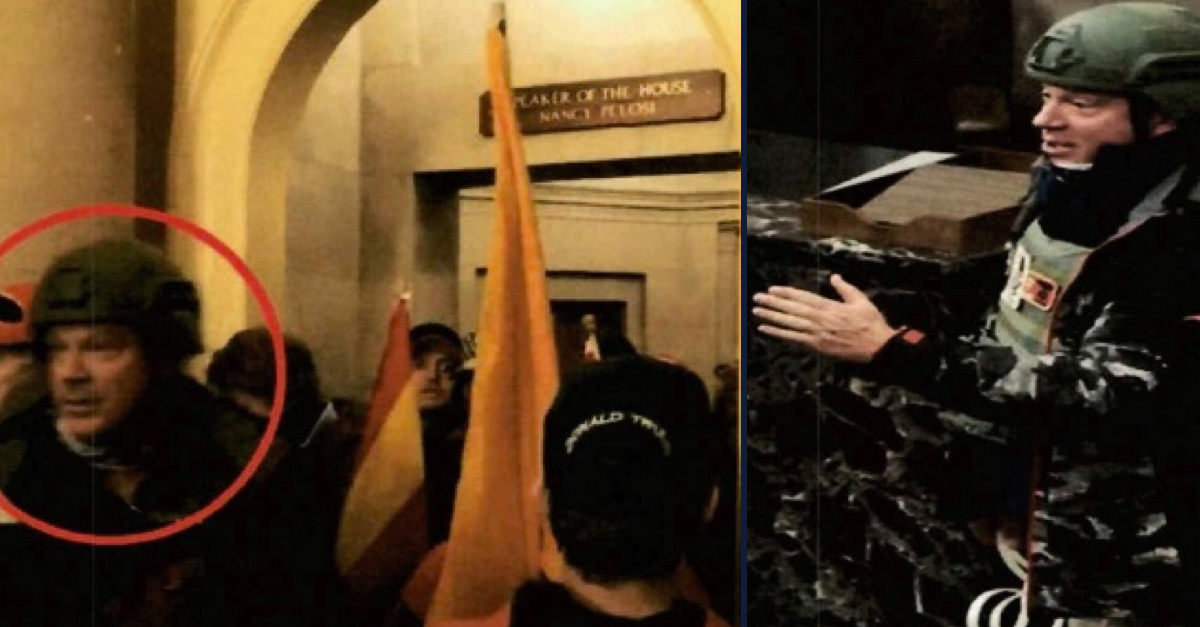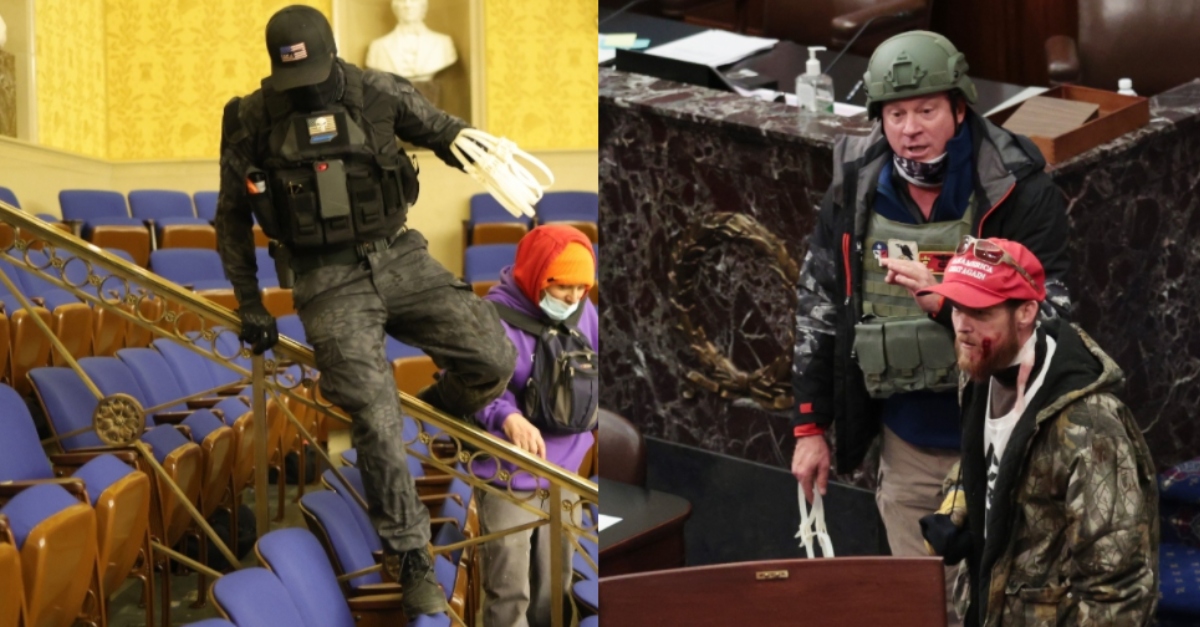
This image from Senate Television video, contained in the Justice Department’s affidavit in support of a criminal complaint and arrest warrant for Larry Rendall Brock, shows Brock, right, on the floor of the Senate at the U.S. Capitol on Jan. 6, 2021, in Washington (Department of Justice via AP).
Federal prosecutors say the behavior of Jan. 6 rioter and retired U.S. Air Force lieutenant colonel Larry Brock while in prison, including posting “calls to action” to other Jan. 6 defendants, deeming himself a commander of a self-stylized “5th Allied Political Prisoner of War Wing” and issuing online guidance through a proxy about the need for total loyalty to Donald Trump by all Jan. 6 defendants — should be enough to convince a judge to bar his release pending appeal.
Brock, 55, referred to the prison where he is housed in Missouri as a “gulag,” prosecutors say, and he has allegedly made remarks that “until such time as relieved by Colonel Rhodes or other senior officer,” the “prisoners of war” from Jan. 6 should not “break faith with [their] fellow patriots or make statements disloyal to Trump.”
It is unclear who “Rhodes” is and Brock’s attorney did not immediately respond to a request for comment. Elmer Stewart Rhodes, notably, however, is the currently imprisoned seditious conspiracist and onetime leader of the Oath Keepers, a group once heavily populated by former military veterans.
“Keep your heads up. You are not criminals. Follow the rules of the Commandant of the gulag you are just imprisoned in. Trust in God and the American people to deliver you from the actions of this illegitimate administration and its weaponized justice system,” Brock wrote in a now-deleted post on X.com, then Twitter, in July 2023.
But Brock says those remarks and others cited by the government as they seek to keep him imprisoned are neither proof nor indication that he poses a “violent” danger to the community if freed on appeal. Instead, he says, they are expressions of protected free speech.
Brock rifled through senators’ desks on Jan. 6 during a near 40-minute long spree inside the Capitol and he received a two-year sentence last March following a jury conviction’s in November 2022.
Court records show he sent a torrent of messages in 2020 fueled by conspiracy theories that the presidential election had been stolen from Trump. In one message posted to Facebook just a few months before he would arrive at the Capitol replete with tactical helmet and vest — and a pair of flexi-cuffs he found on the Capitol floor in hand — Brock said it was imperative to “get to the bottom of this conspiracy” that he said rigged Trump’s defeat.

Larry Rendall Brock (via court filings).
“We need to execute the traitors that are trying to steal the election,” he wrote in the November 2020 post. “And that includes the leaders of the media and social media aiding and abetting the coup plotters.”
Fast forward three years later and when prosecutors first submitted their sentencing memorandum for Brock last March, they noted that while he was not physically violent on the day of the attack, he came extremely close to being in the exact situation he had “fantasized” about: He had only breached the Senate floor mere moments after then-Vice President Mike Pence was evacuated with other lawmakers.
“Had the Senate Gallery not been emptied minutes before, Brock could have come face-to-face with the politicians he had fantasized about seizing and interrogating. Even the seemingly more altruistic parts of Brock’s behavior fit into his professed plans. As noted [in the government’s sentencing memorandum], he asserted ‘Do not kill LEO unless necessary,’” the prosecutors wrote. (Emphasis original.)
Brock appealed his conviction and sentence for felony obstruction of an official proceeding plus a number of misdemeanors. His conviction was upheld by the U.S. Court of Appeals for the D.C. Circuit on March 1 but a resentencing was requested. The court found that while Brock’s interference with the counting of the vote “no doubt” endangered Congress, it did not interfere with the “administration of justice” because lawmakers were engaged in certifying the election, not administering justice. It was argued that because of this an enhancement put on his sentence by the lower court was improper.
Prosecutors wanted Brock to serve five years but the Grapevine, Texas, resident was only sentenced to two years last March.

Men identified as Eric Gavelek Munchel (in black, hopping over rail), and Larry Rendell Brock (in combat helmet).
The same statute has been applied in at least 100 other cases tied to Jan. 6 and is at the center of a similar but separate debate poised to go forward with oral arguments before the U.S. Supreme Court on Tuesday in Fischer v. United States, as Law&Crime previously reported.
That case could have huge ramifications for hundreds of Jan. 6 rioters as well as impact some of the criminal charges Trump faces in his four-count election subversion indictment. Brock’s resentencing will not be decided until after a decision in that case is made.
As for Brock’s conduct here and now, once prosecutors raised their warnings last week, the retired lieutenant colonel responded through his attorney in a five-page brief.
His messages about his imprisonment from July 2023 were invoking Bible passages about holding faith in the face of anxious or difficult times, he said.
“The message does not suggest that other Jan. 6 inmates should commit criminal acts or otherwise endanger the community,” wrote Brock’s attorney Charles Burnham, adding that Brock also did not encourage prisoners to escape as prosecutors have said.
They wrote:
Brock instructed other inmates to adhere to the military code of conduct, and instructed his social media manager to make the post available as a ‘morale boost’ for fellow J6 inmates … Brock told BOP personnel he identified as the Senior Ranking Officer of the 5th Allied PPOW wing, and that he did not necessarily want to be the leader of the group, but had to take the leadership role because ‘one of the articles of the military code of conduct requires it.’ Brock further stated that ‘until such time as a more senior member of the J6 group relieves him of his command he will remain in a leadership role.’
U.S. attorneys said Brock had an interview with Bureau of Prisons personnel about his posts. Brock allegedly told a BOP staffer that his message was only meant “to get other January 6 inmates to follow the military code of conduct and that January 6 inmates were political prisoners who should follow the code of conduct.”
“When asked about the article in the military code of conduct directing prisoners to escape, Brock stated, ‘I guess I should have specifically said do not attempt escape,’” prosecutors wrote in their supplemental brief opposing his release pending appeal.
Brock’s attorney has raised some questions about the authenticity of prosecutors’ claims about his client’s conduct in prison and simultaneously urged the court to limit any restraints on “classic political speech.”
“Like millions of Americans, Mr. Brock is critical about the law enforcement response to January 6 and has been vocal about those views. Punishing Mr. Brock for these statements would be a clear First Amendment violation and manifest injustice,” Burnham wrote.
Have a tip we should know? [email protected]

